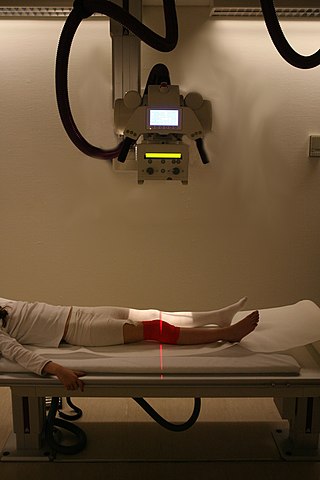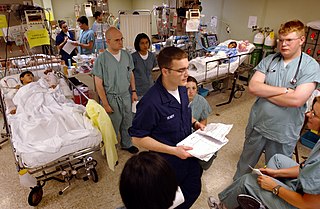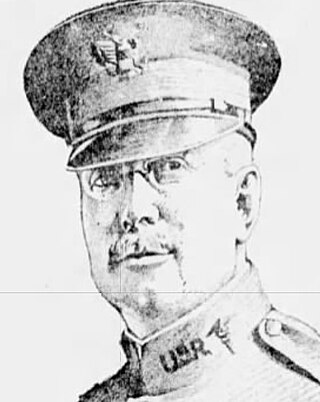Related Research Articles

Biomedical engineering (BME) or medical engineering is the application of engineering principles and design concepts to medicine and biology for healthcare applications. BME is also traditionally logical sciences to advance health care treatment, including diagnosis, monitoring, and therapy. Also included under the scope of a biomedical engineer is the management of current medical equipment in hospitals while adhering to relevant industry standards. This involves procurement, routine testing, preventive maintenance, and making equipment recommendations, a role also known as a Biomedical Equipment Technician (BMET) or as a clinical engineer.

Radiography is an imaging technique using X-rays, gamma rays, or similar ionizing radiation and non-ionizing radiation to view the internal form of an object. Applications of radiography include medical and industrial radiography. Similar techniques are used in airport security,. To create an image in conventional radiography, a beam of X-rays is produced by an X-ray generator and it is projected towards the object. A certain amount of the X-rays or other radiation are absorbed by the object, dependent on the object's density and structural composition. The X-rays that pass through the object are captured behind the object by a detector. The generation of flat two-dimensional images by this technique is called projectional radiography. In computed tomography, an X-ray source and its associated detectors rotate around the subject, which itself moves through the conical X-ray beam produced. Any given point within the subject is crossed from many directions by many different beams at different times. Information regarding the attenuation of these beams is collated and subjected to computation to generate two-dimensional images on three planes which can be further processed to produce a three-dimensional image.
Medical physics deals with the application of the concepts and methods of physics to the prevention, diagnosis and treatment of human diseases with a specific goal of improving human health and well-being. Since 2008, medical physics has been included as a health profession according to International Standard Classification of Occupation of the International Labour Organization.
A radiation therapist, therapeutic radiographer or radiotherapist is an allied health professional who works in the field of radiation oncology. Radiation therapists plan and administer radiation treatments to cancer patients in most Western countries including the United Kingdom, Australia, most European countries, and Canada, where the minimum education requirement is often a baccalaureate degree or postgraduate degrees in radiation therapy. Radiation therapists can also prescribe medications and radiation, interpret tests results, perform follow ups, reviews, and provide consultations to cancer patients in the United Kingdom and Ontario, Canada . In the United States, radiation therapists have a lower educational requirement and often require postgraduate education and certification in order to plan treatments.

An engineering technologist is a professional trained in certain aspects of development and implementation of a respective area of technology. An education in engineering technology concentrates more on application and less on theory than does an engineering education. Engineering technologists often assist engineers; but after years of experience, they can also become engineers. Like engineers, areas where engineering technologists can work include product design, fabrication, and testing. Engineering technologists sometimes rise to senior management positions in industry or become entrepreneurs.
The Engineering Council is the UK's regulatory authority for registration of Chartered and Incorporated engineers and engineering technician. The Engineering Council holds the national registers of over 228,000 Engineering Technicians (EngTech), Incorporated Engineers (IEng), Chartered Engineers (CEng) and Information and Communications Technology Technicians (ICTTech). The Engineering Council is also responsible for establishing and upholding globally acknowledged benchmarks of professional competence and ethical conduct, which govern the award and retention of these titles. This guarantees that employers, government bodies, and the broader society, both within the UK and abroad, can place their trust in the expertise, experience, and dedication of engineers and technicians who are professionally registered with the Engineering Council.
A biomedical engineering/equipment technician/technologist or biomedical engineering/equipment specialist is typically an electro-mechanical technician or technologist who ensures that medical equipment is well-maintained, properly configured, and safely functional. In healthcare environments, BMETs often work with or officiate as a biomedical and/or clinical engineer, since the career field has no legal distinction between engineers and engineering technicians/technologists.

Clinical engineering is a specialty within biomedical engineering responsible for using medical technology to optimize healthcare delivery.

Radiographers, also known as radiologic technologists, diagnostic radiographers and medical radiation technologists are healthcare professionals who specialise in the imaging of human anatomy for the diagnosis and treatment of pathology. Radiographers are infrequently, and almost always erroneously, known as x-ray technicians. In countries that use the title radiologic technologist they are often informally referred to as techs in the clinical environment; this phrase has emerged in popular culture such as television programmes. The term radiographer can also refer to a therapeutic radiographer, also known as a radiation therapist.

The Society of Radiographers (SoR) is a professional body and trade union that represents more than 90 percent of the diagnostic and therapeutic radiographers in the United Kingdom. The College of Radiographers (CoR) is a charitable subsidiary of the Society, they are collectively known as the Society and College of Radiographers (SCoR).

The Institute of Physics and Engineering in Medicine (IPEM) is the United Kingdom's professional body and learned society for physicists, engineers and technologists within the field of medicine, founded in 1995, changing its name from the Institution of Physics and Engineering in Medicine and Biology (IPEMB) in 1997. The Institute is governed by an elected Board of Trustees reporting to which are the Science, Research and Innovation Council and the Professional and Standards Council. The councils have operational responsibility for scientific and professional aspects of the Institute's work, respectively. Beneath the councils is a substructure of committees, groups and panels of members, which undertake the work of the Institute.
The Institute of Healthcare Engineering and Estate Management (IHEEM) is the UK's largest specialist Institute for the Healthcare Estates Sector; devoted to developing careers, provision of education and training and registering engineers as Eng Tech, IEng and CEng.
The American Society of Radiologic Technologists (ASRT) is a professional membership association that serves medical imaging technologists, radiation therapists, and radiologic science students. The organization, located in Albuquerque, New Mexico provides its members with ongoing education and professional development opportunities.
In the United Kingdom, a Chartered Engineer (CEng) is an engineer registered with the UK's regulatory body for the engineering profession, the Engineering Council. Chartered Engineers are master's degree qualified or can demonstrate equivalent masters level, work-based learning and have gained the appropriate professional competencies through education, further training and working experience. Demonstration of competence is defined in the UK Standard for Professional Engineering Competence, assessed through professional review of academic qualifications and professional development. Formal, non-formal and informal learning can be assessed. The title Chartered Engineer is protected in the UK under law by means of the Engineering Council’s Royal Charter and Bye-laws. As of 2019 there are approximately 180,000 engineers registered as a Chartered Engineer. Chartered Engineers are registered through Professional Engineering Institutions (PEIs) licensed by the Engineering Council which are relevant to their industry or specialism.
Medical equipment management is a term for the professionals who manage operations, analyze and improve utilization and safety, and support servicing healthcare technology. These healthcare technology managers are, much like other healthcare professionals referred to by various specialty or organizational hierarchy names.

Industrial engineering is an engineering profession that is concerned with the optimization of complex processes, systems, or organizations by developing, improving and implementing integrated systems of people, money, knowledge, information and equipment. Industrial engineering is central to manufacturing operations.

John George Trump was an American electrical engineer, inventor and physicist. A professor at the Massachusetts Institute of Technology (MIT) from 1936 to 1985, he was a recipient of the National Medal of Science and a member of the National Academy of Engineering. Trump was noted for developing rotational radiation therapy. Together with Robert J. Van de Graaff, he developed one of the first million-volt X-ray generators. He was the uncle of Donald Trump.
William John Hancock D.Sc. (Hon), MIEE, MICE, LRCP was an Australian of Irish descent, an electrical engineer, telephone pioneer and pioneer in X-rays in the colony of Western Australia. He was honorary radiologist for Perth Hospital and Base Hospital in Fremantle. His list of credentials and accomplishments include M.I.E.E., Member of the Institution of Electrical Engineers, M.I.C.E., Member of the Institution of Civil Engineers, L.R.C.P., Licentiate of the Royal College of Physicians and D.Sc. (Honorary).

Eugene W. Caldwell (1870–1918) was an American engineer, radiographer, and physician who conducted early work on the medical uses of X-rays. A native of Missouri, Caldwell studied engineering at the University of Kansas. After working as an engineer for five years, Caldwell became interested in X-rays in 1897, opening what may have been the first X-ray clinic in New York City. He taught radiography at University and Bellevue Hospital Medical College and later graduated with a medical degree from that institution.
A clinical technologist, also known as a healthcare science practitioner, is a medical professional involved in the practical delivery of medical physics and clinical engineering services. In some locations there is considerable overlap in closely related terms, for example in many countries technologist and radiographer are synonyms, while in the United Kingdom they are considered separate professions. Clinical technologists can be found in nuclear medicine, radiotherapy, radiation protection, and rehabilitation engineering departments, and they are often described by their scope of practice.